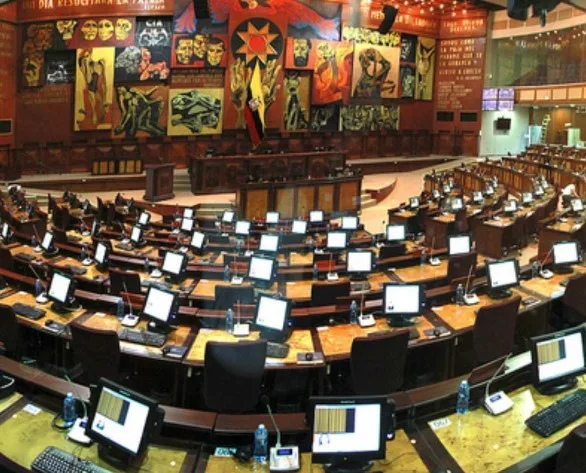What the hell happened in Sunday’s election and how will it play out in October and beyond?
How does a presidential candidate go from 5% in the polls to almost 24% at the ballot box in 10 days? How does another drop from 15% to 4% in the same period? How is it that the leaders of National Assembly and of the movement to impeach President Guillermo Lasso failed to be reelected? How does the dominant party in the Assembly gain seats but lose political clout?
President Guillermo Lasso failed to be reelected? How does the dominant party in the Assembly gain seats but lose political clout?
These are some of the questions being asked following Sunday’s election. The answers don’t come easily, and the experts admit to being wrong in their prognostications. And baffled.
Almost everyone knew the assassination of Fernando Villavicencio would have a big impact on the election. Election-watchers were also aware of the high degree of voter indecision – the highest in any recent election, according to the polls. No one, however, figured out how those factors would play out on Sunday.

Ecuador’s National Assembly
How Daniel Noboa managed to rise from single-digit support in the last official polls to a place in the runoff with Citizens Revolution candidate Luisa González is the biggest mystery. On Sunday night and Monday, the analysts agreed his last-minute surge was based on several unforeseen factors: his impressive performance in the presidential debate and the fact that he was a young, new face unconnected to the old guard. Very important too, they speculated, was his understanding of how to connect to young voters through social media.
There are other factors too. Of all the candidates responding to Villavicencio’s assassination, Noboa alone admitted Villavicencio had the “best, most sophisticated” plan to combat the drug cartels. If elected, he said he would adopt much of that plan. His low-key, likeable personality, both during his time in the National Assembly and on the campaign trail, may have also played a role.
No matter the reasons for Noboa’s meteoric rise, he is suddenly the shocking odds-on favorite to win the presidency in October.
The results of the National Assembly election are more comprehensible but still surprising. With its well-oiled political machine — certainly the most efficient in Ecuador — and its hard-core support of 25% of voters, the Correista Citizens Revolution maintained its position as the largest, albeit minority, bloc in the Assembly. At the same time, however, it probably lost its ability to set the agenda as it did in the last Assembly, as its coalition of allies fell apart. Although new alignments will form, they are unlikely to follow Correista marching orders.
Although the center-right Social Christians will have 15 or 16 seats in the new Assembly, they will probably end their partnership with Citizens Revolution since that partnership was based primarily on party leader Jaime Nebot’s feud with Lasso. And there is the demise of other blocs, most notably the Democratic Left and the indigenous Pachakutik movement that dropped from 24 seats to five. And then, there is the emergence of new players, such as Villavicencio’s Contruye Movement, which could have as many as 30 seats, and of Noboa’s National Democratic Action party, with 13.
There will be notable individual absences in the new Assembly, some predictable, others not. Among those losing their seats are Assembly President Virgilio Saquicela and several other leaders of the effort to impeach Lasso, including Social Christian Esteban Torres. Former Assembly President, Guadalupe Llori, deposed by the Correistas early in her term, is another election casualty.
Predictably, speculation among Ecuador’s political class now focuses on the future of the Citizens Revolution and its indefatigable leader, Rafael Correa. What’s next for the Correistas if they cannot control the Assembly? Or, if González loses in October?
Within hours of the election, some disappointed CR members, particularly younger ones, were criticizing party strategy and the iron-fisted control of Correa. Some complained openly while several private emails of party leaders were leaked.
An anonymous CR campaign worker and former asambleista said it is time for CR to change its approach and its message. “We must change with the times or we will become irrelevant,” she wrote. “We do not need to abandon our leftist beliefs, but we must leave behind the outdated language and strategy of Soviet-era socialism. We must pay attention to younger voters, many of them who have little memory of the early years of the Citizens Revolution.”
She added that most Ecuadorians care little for ideology, leftist or rightist. “They want the gangs defeated and they want to be safe. And they want good jobs and an economy that offers opportunity. Sometimes we forget what people care about the most.”
Another social media message, also anonymous, said it was time for Correa to step aside and allow CR members on the ground in Ecuador to set their own strategies and speak freely. Like the other social media poster, he warned that the party is ignoring the young. “Why will Noboa probably win?,” the writer asks. “He understands the language of the new generations and he knows how to communicate on TikTok.”





















